MercoPress. South Atlantic News Agency
Tag: Falklands referendum
-
Friday, March 10th 2023 - 12:32 UTC
Falkland Islands: Result of referendum remains clear 10 years on
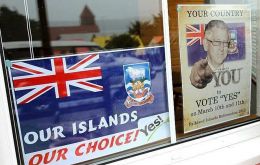
Over 10 and 11 March 2013, Falkland Islanders overwhelmingly decided their future political status. The referendum asked voters “Do you wish the Falkland Islands to retain their current political status as an Overseas Territory of the United Kingdom?”
-
Friday, March 10th 2023 - 10:40 UTC
Uruguayan news team visits Falklands ahead of referendum's 10th anniversary

A team from Uruguay's news show Telenoche (Montevideo's Channel 4) is visiting the Falkland Island marking the 10th anniversary of the referendum whereby the local population ratified its will to remain a British Overseas Territory despite sovereignty claims from Argentina.
-
Thursday, March 9th 2023 - 19:37 UTC
The Falklands' voice heard: Commemorating 10 years since the Referendum
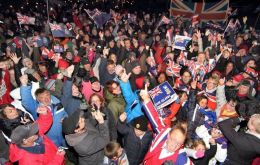
Ten years ago, the people of the Falkland Islands participated in a landmark referendum, overseen by international observers, to determine their political status as an Overseas Territory of the United Kingdom. The question posed was, “Do you wish the Falkland Islands to retain their current political status?” and an overwhelming 99.8% of voters, on a 92% turnout, chose to remain a self-governing territory of the UK.
-
Friday, March 3rd 2023 - 20:31 UTC
Falkland Islands responds to Argentina’s decision to end the “Foradori-Duncan Pact”
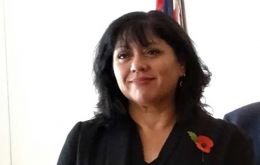
Members of the Legislative Assembly are disappointed to hear of Argentina’s decision to put an end to the “Foradori-Duncan Pact” of 2016. This pact looked at improving relations on trade and security between the UK and Argentina but it also ensured the agreement to identify the remains of the unknown Argentine soldiers buried near Darwin.
-
Friday, March 3rd 2023 - 09:50 UTC
Cleverly insists: the Falklands are British
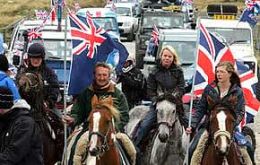
British Foreign Secretary James Cleverly wrote on Twitter that the Falkland “islanders have the right to decide their own future: they have chosen to remain an autonomous British Overseas Territory,” and therefore “the Falkland Islands are British.”
-
Saturday, March 12th 2022 - 06:34 UTC
In 2013, “we reaffirmed our wish to be a part of Global Britain”, Falklands Legislative Assembly chair

UK's news agency Press Association has interviewed the current chair of the Falkland Islands Legislative Assembly, MLA Teslyn Barkman on the 40th anniversary of the Falklands' war and the ninth, on the self-determination referendum from March 2013.
-
Monday, February 28th 2022 - 20:24 UTC
Cristina Fernández de Kirchner still complaining about Falklands' 2013 referendum

Argentina's main leader and vice-president, Cristina Fernández de Kirchner recalled on Sunday in Twitter that her government strongly supported Ukraine back in 2014, when Russia annexed Crimea, but also complained about the double standard of the “great powers” in their stance regarding the Falkland/Malvinas Islands issue.
-
Wednesday, February 16th 2022 - 09:50 UTC
Falklands Government reiterates the need to respect human rights and democratic liberties of the Falklands' nation

On Tuesday the Falklands government in an official release reiterated the need for human rights and democratic liberties of the Falklands' nation to be respected, particularly self-determination.
-
Saturday, February 12th 2022 - 12:15 UTC
Britain, China and the Falkland Islands: Why the US must weigh in

By Dov S. Zakheim (*)This year marks the 40th anniversary of the Falklands War. Argentine forces invaded the Falkland Islands, a British Overseas Territory, on April 2, 1982.
-
Wednesday, September 23rd 2020 - 08:45 UTC
Falklands votes on Thursday on a single electoral constituency referendum
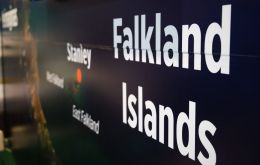
Next Thursday, 24 September, Falklanders will be going to the polls to vote on a referendum on a Single electoral Constituency for the whole archipelago. Currently, there are two constituencies in the Falklands, Stanley the capital, which elects five of the eight members of the Legislative Assembly, and the so-called Camp, which represents the rest of the territory and sends three representatives.
